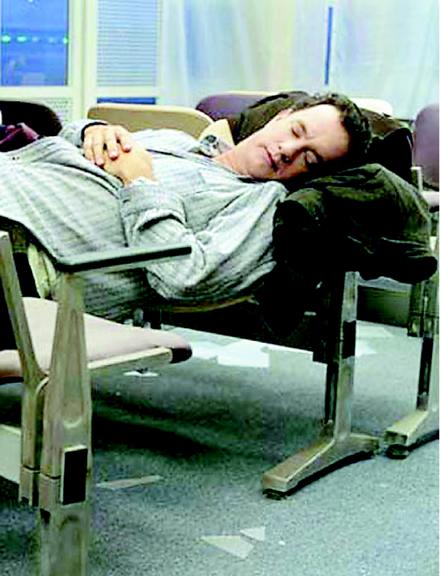Both films coasted on a tiny molecule of an idea, but were kept afloat by the light directorial touch of Spielberg and the sheer likability of his cast. Perhaps they represent a fresh, stylistic return to his roots or maybe just an inconsequential, palate-cleansing respite before his return to the overblown blockbuster territory of Jurassic Park IV. Either way, we'll enjoy it while we can.
In The Terminal Hanks plays Viktor Navorski, a tourist from the Eastern European country of Krakoshia, who arrives at New York's J.F.K. Airport to the tune of some very bad news. Seems that, while he was en route to America, Viktor's country suffered a bloody coup. With the rightful government overthrown, Viktor's country has—in bureacratic terms—ceased to exist. Hence, Viktor's passport is null and void. He can't enter America, and he can't return to his homeland. He is, quite literally, a man without a country.
Viktor's first major encounter is with the airport's overworked Department of Homeland Security official, Frank Dixon (Stanley Tucci). Frank dutifully explains to the newly arrived tourist (who doesn't actually speak English) that he is not allowed to leave the airport terminal until his paperwork snafu is cleared up.
Days later, with the revolution in Krakoshia showing no signs of letting up and Viktor taking up residence in the unfinished Gate 86, Frank realizes he's got a problem on his hands. Frank figures the best solution is to pass the buck. Frank tells Viktor he is free to leave, hoping he'll get arrested by immigration and become somebody else's problem. Having grown up under communist rule, Viktor is more than a little wary of government officials and decides to dig in his heels and wait it out in the airport terminal. Naturally, this sets up some growing animosity between the officious Frank Dixon and the genial monkeywrench in the works that is Viktor Navorski.
Setting a film in the Starbucks- and Burger King-clogged environs of a major airport makes for a nice microcosm of America. Over the course of this economical comedy, Viktor slowly makes friends with the racially diverse airport workers (including Chi McBride, Diego Luna and Kumar Pallana), lands himself a job and finds time to romance a comely flight attendant (Catherine Zeta-Jones). The comedy grows organically from the characters and, at times, even feels a bit improvised, which is saying something for the king of organization and preplanning, Señor Spielberg.
Hanks needs little in the way of praise. He does a wonderful job, and few in the audience would expect less of him. Zeta-Jones has a markedly smaller role, but shows a nice vulnerability in her romantically confused character. I'm not a big fan of Tucci when he takes on “villain” roles because he tends to overact wildly (see: The Core, Big Trouble, Road to Perdition). He does take on a fairly stereotypical bad guy role here, but he underacts it, steering just clear of moustache-twirling villainy. Spielberg is also capable of overplaying his hand, piling on the schmaltz until audiences are drowning in it. The Terminal has a minimal coating of the stuff. Spielberg keeps the performance of his actors simple and genuine and his directorial touch is so light, you hardly even notice there's a superstar behind the camera.
The script, based on an idea by The Truman Show scripter Andrew Niccol, is minimal, but doesn't end up going in a conventional direction. The end features enough small twists that audiences won't feel like they've been cheated by some predictable Hollywood formula.
All in all, The Terminal is a gigantic zeppelin of a film—an engagingly airy creation held spectacularly aloft by the buoyant charm of its central players. A timely fable of paranoia, xenophobia and the melting pot that is America, The Terminal is, quite possibly, the sweetest, most enjoyable layover you'll have all summer.



